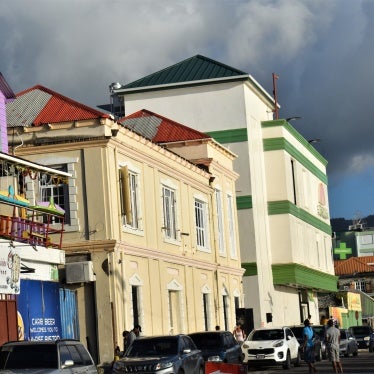Dear Mr. President:
I am writing on behalf of Human Rights Watch to discuss the role of human rights in Brazilian foreign policy. We would like to encourage you to ensure that Brazil plays a greater role in the promotion of human rights worldwide, particularly as it assumes a seat on the U.N. Security Council.
Dear Mr. President:
I am writing on behalf of Human Rights Watch to discuss the role of human rights in Brazilian foreign policy. We would like to encourage you to ensure that Brazil plays a greater role in the promotion of human rights worldwide, particularly as it assumes a seat on the U.N. Security Council.
Because of your long personal commitment to the poor and marginalized, we believe that you have the credibility necessary to make Brazil a leader in the struggle for the rights of people everywhere. We also believe that support for human rights is firmly in Brazil’s national interest and directly reflects Brazil’s highest ideals.
Already, during your first year in office, Brazil has taken important steps on several international fronts, including on protecting the rights of sexual minorities, defending the International Criminal Court, and curbing the deadly trade in small arms. You have also elevated the issues of poverty and hunger on the global agenda. At the same time, we were disappointed by Brazil’s failure to condemn certain abusive governments at the U.N. Commission on Human Rights, and by your unwillingness to speak about abuses in countries that you visited, such as Egypt, Libya, Syria, and Cuba.
In the future, we encourage you to conduct more active bilateral diplomacy regarding human rights. We also hope that Brazil will endorse and champion the “Vieira de Mello Principles,” which ask states seeking election to the U.N. Commission on Human Rights to make positive human rights commitments.
Leadership on Key Issues
Last year, Brazil presented a ground-breaking resolution at the U.N. Commission on Human Rights expressing concern at abuses against persons on the grounds of their sexual orientation and calling on states to “promote and protect the human rights of all persons regardless of their sexual orientation.” This was the first time, at long last, that a resolution specifically focusing on sexual orientation had been brought before the Commission. Unfortunately, although it was co-sponsored by twenty other countries, the resolution was shelved at the last moment. But we have high hopes that with Brazil’s leadership and the support of civil society groups around the world, and with greater advance consultation than last year, this landmark resolution will be passed at the upcoming 60th session of the Commission.
We also commend your efforts to maintain the integrity of the Rome Statute of the International Criminal Court (ICC). The establishment of the ICC last year represented a profound step forward in the fight against impunity for the worst international crimes, and the court has now become operational, with a distinguished Brazilian jurist as one of its eighteen judges. Against this progress, the U.S. government has engaged in a wide-ranging campaign to undermine the ICC, including an effort to bully states into signing “Bilateral Impunity Agreements” exempting U.S. nationals from the ICC’s jurisdiction. Last July, Brazil took a welcome stance by not only refusing to sign such an agreement, but also by publicly stating that such an accord would “run counter to the letter and the spirit of the Rome Statute and constitutes a threat to the judicial equality of States.”
In the area of HIV/AIDS, Brazil has also shown admirable leadership. It has been one of the principal players in the global struggle for access to affordable antiretroviral medicines and in promoting flexibility in the patent rules of international trade agreements. With regard to this issue, we urge you to make the most of the existing international patent regime to expand treatment access within Latin America. As you are no doubt aware, following negotiations related to paragraph six of the Declaration on the TRIPS Agreement and Public Health (the “Doha Declaration”), the government of Canada amended its Patent Act to allow the issuance of compulsory licenses to export patented drugs to the developing world, particularly sub-Saharan Africa. Though this initiative was flawed in some respects, Brazil has an opportunity to follow and improve upon the Canadian initiative in a way that would benefit of the millions of people living and dying with HIV/AIDS around the world.
We were also encouraged that you recently gave your support for an international Arms Trade Treaty. The uncontrolled proliferation and widespread misuse of small arms represents a global crisis. Brazil has also been a leading voice in pressing governments to comply with the commitments made at the World Conference against Racism in Durban, South Africa. Brazil has also consistently emphasized that policies adopted to counter terrorism must not infringe on human rights, a key concern around the world.
Your government has also maintained an exemplary record of cooperation with rapporteurs and expert groups of the U.N. Commission on Human Rights. Brazil is one of 48 countries that have issued a standing invitation to these mechanisms to undertake visits. Over the past year, two rapporteurs—on extrajudicial, summary, or arbitrary executions and on the sale of children, child prostitution, and child pornography—visited Brazil and received the fullest cooperation from the authorities. The former even had a long and substantive meeting with you. Brazil also voted in 2003 against a resolution which would have limited the power of the Commission’s experts to issue urgent appeals. Brazil has also stepped up its cooperation with the OAS human rights system.
Brazil also has kept up an impressive record of involving civil society in the preparation of its periodic reports regarding compliance with the major human rights treaties. This year, Brazil also played a supportive role in the adoption of the Optional Protocol to the Convention Against Torture, which will seeks to eradicate torture through a preventive system of regular, independent visits to places of detention.
Shortcomings of Brazilian Foreign Policy
At the same time, we were disappointed by Brazil’s failure to condemn certain abusive governments at the U.N. Commission of Human Rights in Geneva. While Brazil commendably supported resolutions addressing abuses in Belarus, the Democratic People’s Republic of Korea, Iraq, the Israeli-Occupied Territories, and the Sudan, Brazil’s voice was missing in some other critical situations:
- Brazil voted against a resolution to criticize abuses in Chechnya, despite ongoing serious violations of human rights and international humanitarian law by both parties to the conflict. In the months prior to the Commission’s session, Russian forces in dozens of sweep operations rounded up thousands of men, looted homes, physically abused villagers, and in some cases committed extrajudicial executions. Those detained faced beatings and other forms of torture, aimed at coercing information or confessions about Chechen forces. Federal forces routinely extorted money from detainees’ relatives as a condition for release, and also required detainees upon release to sign statements that their treatment in custody was adequate. In hundreds of cases, those last seen in the custody of Russian forces “disappeared,” never to be seen again by their relatives.
- Brazil abstained on a resolution to criticize abuses in Turkmenistan, one of the most repressive states in the world. Saparmurat Niazov, president for life, tolerates no opposition and crushes critical thinking. Since its independence from the Soviet Union, there has not been a single nationwide election that could be considered free or fair. Those few opposition figures who have not left to live in exile do not dare speak out again, after awful experiences endured in prison and the constant surveillance to which they are subjected by the authorities. No independent human rights organizations can operate in Turkmenistan, and the media is subjected to strict pre-publication censorship.
- Brazil also abstained on a watered-down, mild-mannered resolution sponsored by Uruguay, Peru, and Costa Rica on the human rights situation in Cuba. Cuba has long restricted nearly all avenues of political dissent. It has denied its people basic rights to free expression, association, assembly, movement and a fair trial. It has frequently sought to silence its critics by using short-term detentions, house arrests, travel restrictions, threats, surveillance, politically motivated dismissals from employment, and other forms of harassment. But the crackdown on political dissent that began in March 2003, as the Commission session got underway, included three executions and the prosecution of seventy-five political dissidents, making it the worst in scale and intensity in decades.
These votes seemed to reflect political selectivity, or at least diplomatic expediency, which we consider unworthy of Brazil. Brazil has rightly criticized the selectivity of the Bush administration; it should not itself yield to the same considerations. Given that Chechnya, Turkmenistan, and Cuba are all likely to be on the Commission’s agenda again in 2004, we hope that Brazil will adopt a more consistent position in defense of rights.
Similarly, we had hoped that you would have taken greater advantage of your own visits to other countries to address human rights abuses. Brazil is of course entitled to maintain friendly relations with as many countries as possible, but friendship also implies responsibility. When you visited Cuba, you refused to comment on the crackdown described above, saying that you don’t discuss “internal political conditions of other countries.” Summary executions and arbitrary arrests are not “internal political” issues, however. Because of your close relations with the government of Cuba, you are in a uniquely strong position to address human rights violations there. On your recent trip to the Middle East, you laudably spoke out against Israeli settlement practices in the Palestinian territories. We would have been doubly encouraged had you also referred to abuses in some of the countries which you visited, such as Egypt, Libya, and Syria.
An International Human Rights Agenda
As you move forward, we would like to put before you some ideas for Brazil’s tenure on the U.N. Security Council and the Commission on Human Rights, as well as its bilateral human rights policies.
U.N. Commission on Human Rights
Over the past few years, there has been growing concern and debate over the quality of the membership of the U.N. Commission on Human Rights. Increasingly states with poor records that fail to cooperate with the Commission’s procedures have won seats on the Commission. In a recent report to the General Assembly, Secretary-General Kofi Annan noted: “There has been public disquiet over the fact that Governments accused of gross violations of human rights are admitted to membership in the Commission.”
Before his tragic and untimely death in Iraq, Sergio Vieira de Mello, then U.N. High Commissioner for Human Rights, stated: “Membership of the Commission on Human Rights must carry responsibilities. I therefore wonder whether the time has not come for the Commission itself to develop a code of guidelines for access to membership of the Commission and a code of conduct for members while they serve on the Commission. After all, the Commission on Human Rights has a duty to humanity and the members of the Commission must themselves set the example of adherence to the international human rights norms - in practice as well as in law.”
Human Rights Watch agrees with Vieira de Mello’s views regarding membership. We also think that Brazil would be the ideal country to promote what could be called the “Vieira de Mello Principles” as an incentive for member states seeking election to the Commission to make positive commitments on human rights.
In order to secure broad acceptance, the principles could be couched in positive rather than exclusionary terms, as a set of pledges or commitments member states should make in seeking election to the Commission. These should include:
- A commitment to cooperate fully with the Commission’s Special Procedures before, during, and after visits, and the issuing of a standing invitation for such visits;
- Completion of all outstanding reports to U.N. treaty bodies within their term on the Commission;
- Presentation of a national plan of action on human rights, as required by the 1993 Vienna World Conference on Human Rights;
- A statement of intent with respect to the ratification of major human rights instruments, and the review of any reservations to treaties already ratified;
- A commitment to ensure that voting and deliberations on Commission resolutions is guided by the Commission’s purpose to promote and protect human rights;
- A commitment not to table or vote for any “no-action” motion to obstruct the Commission’s work.
The adoption of such a system of pledges would be a fitting tribute to the late Sergio Vieira de Mello and an important step forward in strengthening the effectiveness of the Commission on Human Rights.
Security Council
On January 1, Brazil took its seat as an elected member of the Security Council. In recent years, the Council has made significant progress in recognizing the importance of human rights for its work. The leading force in this process has been elected members. We hope that Brazil will continue this trend. In this vein we call on you to work towards the following goals while on the Council:
- To ensure that new UN peace-keeping operations are provided with strong and unambiguous mandates and adequate resources to protect civilians and that, where appropriate, the operations have a human rights component;
- To ensure that the Security Council insist that there will be no impunity for genocide, war crimes, and crimes against humanity;
- To increase the Council’s interaction with the High Commissioner for Human Rights and the U.N.’s monitoring mechanisms, especially for purposes of early warning and conflict prevention.
As a Council member, Brazil will have a key role in defending the integrity of the Rome Statute of the ICC. Last year, Brazil, although then not a Council member, opposed renewal of Security Council Resolution 1422 (now 1487), which exempts UN peacekeepers from prosecution by the ICC if their nations are not member states of the court. We expect that the U.S. will seek renewal of that resolution this spring. We look to your government to once again oppose renewal and to join a growing number of Council members in opposing that resolution.
Bilateral Promotion of Human Rights
A government such as Brazil’s does not need to wait until an issue finds its way to the Security Council or the Commission on Human Rights in order to speak up for the victims of persecution, the tortured, the hungry and the dispossessed. Through active bilateral diplomacy—including frank exchanges with the governments concerned, and public criticism when necessary—Brazil can address the worst human rights violations as they occur. If Brazil does so in a non-selective manner and is seen to be acting out of principle rather than politics, such actions will only enhance its standing. As a practical step that would reinforce its ability to integrate human rights concerns throughout the conduct of its foreign policy, Brazil might consider strengthening the ambassadorial-rank human rights office in the Foreign Ministry (Direitos Humanos e Temas Sociais), as many developed countries have done.
We also ask you to raise your own voice to denounce abuses—be they arbitrary detention in Guantanamo, war crimes in Chechnya, or racism in Europe. As a recognized fighter for rights, you have the credibility to stand up for victims everywhere.
As you may know, Human Rights Watch monitors respect for human rights in more than seventy countries around the world, and has been monitoring human rights conditions in Brazil since 1987. We would be delighted to elaborate on all of the issues discussed in this letter during our next visit to Brazil. We look forward to working with you to promote human rights in Brazil and abroad.
Sincerely,
José Miguel Vivanco
Executive Director
Americas Division








